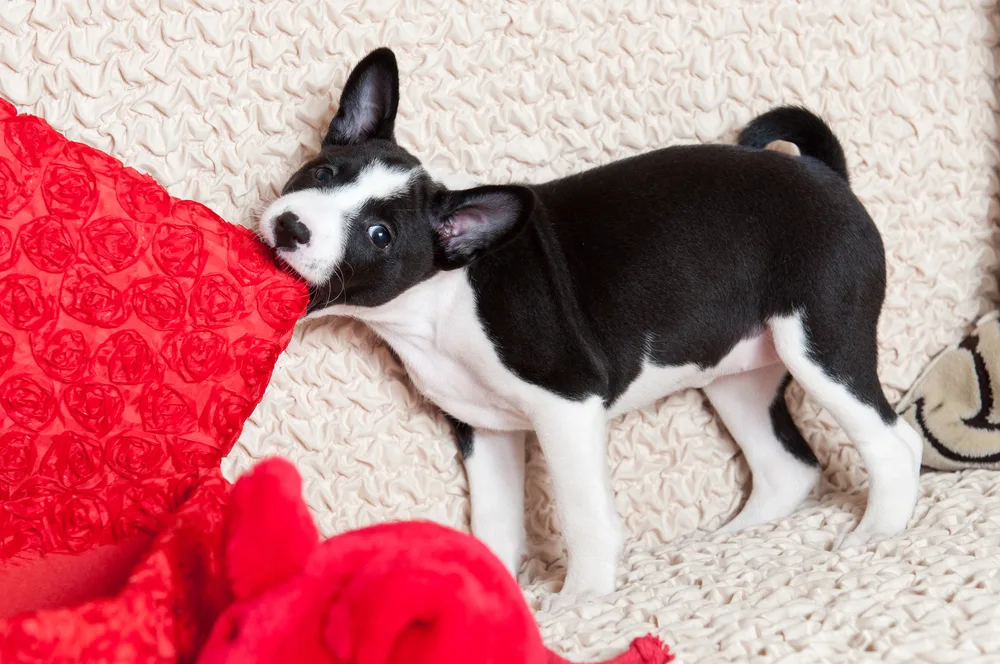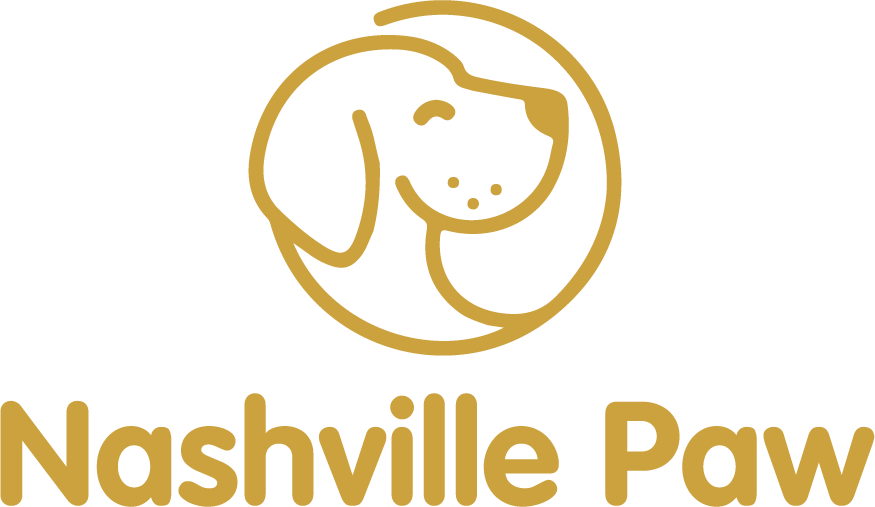Medically Reviewed by Dr. Majid Tanveer, DVM
Your furry baby is home. Like any new parent, you are getting to know your puppy and hoping their growth and development are average.
But what exactly is “normal” regarding your new pup’s behavior?
Is your puppy’s pee all over the house driving you barking mad?
Their uncontrollable eating habits of anything dead, alive, or unanimated, driving you to the end of your leash?
Is your pup’s insistence on destroying everything putting him in the dog house?
Is your pup excited about pouncing on everyone wagging you off?
Then congratulations! You have a healthy, happy puppy.
But when should you start worrying that your puppy’s behavior is a sign that they were weaned too early?
And if you have cause for concern, what can you, as their parents, do?
To understand what causes your puppy to show unwanted behavior, and how specific solutions can help, let’s first look at how vital weaning is to your puppy’s healthy development.
The Weaning Phase

The weaning phase of your puppy’s life is an important one. It marks the time in their life when they stop relying on their mothers’ milk for nutrition and start to eat solid foods.
During this time, your puppy learns invaluable life lessons that will help them to adapt to the big wide world with you, their new parent.
Dr. Sally Foote, the founder of Foote & Friends, states that your puppy should be 7-8 weeks old when they are weaned. If weaned earlier, your new pup may miss playing fair, play-biting, and impulse control guidance. A puppy should be fully weaned by 12-14 weeks, but leaving them with their mother for the entire period is not recommended.
The American Veterinary Society of Animal Behavior says that puppies between 6-12 weeks of age should be experiencing as many different stimuli as possible. They should be exposed to other dogs, people and environments. This reduces the shock they may encounter when placed in a forever home like yours.
Weaning a pup during this golden 6-12 week period will significantly affect their confidence and behavior. If weaning is not done at the correct time, your puppy could be left with psychological and physical effects.
Dr. Sally Foote has published guidance on the progression of impulsive behaviors of puppies, timelines, and solutions here. She states that most unwanted puppy behaviors should have stopped at around eight months.
If your puppy is nearing or has reached this age and you still see behaviors they should have grown out of, then you are in the right place to find solutions.
What signs should you look for that weaning didn’t occur during the golden period?
Loss of Appetite
Your new puppy will experience some stress in their new home. Some puppies are fussier than others. You may struggle to get them to eat in the first few days. Try as many different brands of food and milk until you find one your puppy likes.
Have you tried every brand you can find, and your puppy still refuses to eat? This could be a sign that your puppy has been weaned too early.
Excessive Biting

You expect your puppy to be playful and test the boundaries with their play-biting. But if the biting never seems to stop, it may be time to take action.
Aggressive Behavior

Puppies are learning the rules of engagement with people and other dogs, so some displaced aggression is to be expected.
But if this keeps happening and causing you and your pup distress, it may be time to seek professional help.
Destructiveness

Puppies are renowned for chewing and destroying anything they find. Your favorite shoes, sofa, and carpet are all up for grabs.
But when is destructive behavior a sign that your dog is not doing so well? When the destructiveness becomes less “cute puppy behavior” and more “angry dog on a rampage”.
A friend of mine has a Doberman. Marco. Lovely dog. She got him from a rescue center and expected some issues.
The destruction began but never ended. The final straw was coming home to find six yoga mats chewed to pulp, plants and their pots scattered throughout her house, and toilet rolls confetti in every room. That was the end of her leash. So I guess you need to decide if you have reached yours yet.
Excessive Separation Anxiety
When your puppy is nursing, they are gaining security and comfort from the mother. If taken away too early, your puppy may show separation anxiety. They may whine and bark to excess when left alone. This is perfectly normal.
Dogs never want to be alone. Cesar Millan, a trainer and dog behavioral expert, points out that dogs always follow. They follow their mother and siblings, and you become their leader when they go home with you. If you have already been crate training your puppy at night, this will not be news to you. But if your puppy’s separation anxiety is causing you to cancel your evening plans, or you’re receiving complaints from neighbors, it is probably time to seek advice and help.
Possessiveness
If your puppy has not been shown how to share with his siblings, then it’s no surprise that he shows extreme possessiveness over his toys and food.
If your new pup is showing 3 of these signs, then it is likely they are suffering the effects of weaning done too soon. If your puppy offers more than 3, you are likely suffering from exhaustion, frustration, and a decline in mental health!
Genetics and learned behavior also play a part in your puppy’s development. If you purchased your dog as an adult or rescued them from a shelter, then there will be a lot of history you may not be aware of.
Check with the seller or shelter for important information on your new pup.
What can you do to help yourself and your dog through this tough time?
Training your dog is the only way.
Dogs learn by example and will always take your lead. You will need to be patient throughout the process and show your pup much love and kindness. Remember, you are now their parent so they will look to you for guidance.
Socialization may be what your dog has been missing. Group dog training can be an excellent source of socialization. Taking your dog to the park is also a great way for your puppy and you to meet others like them and share lessons and experiences.
Before embarking on a training program, talk to your vet. They will have a wealth of recommendations and may be able to point you to an excellent local training service.
Here are five training methods that can help you and your dog overcome behavioral issues associated with early weaning.
Positive Reinforcement
This tried and tested method works on the simple principle that your pup will repeat the behavior if rewarded.
If your pup shows wanted behavior, you reward them with a treat. But any unwanted behavior is ignored and unrewarded.
If behavior correction is the goal, the removal of rewards such as treats or their favorite toy should be used.
Any treatment should be given immediately following the wanted behavior. Any negative consequences for unwanted behavior should also be done directly. This way, the behavior is associated with either positive reinforcement or adverse effects.
The Clicker Method
This method also uses positive reinforcement. A device that makes a loud clicking sound is used.
The goal is for your pup to associate the clicking sound with the next treat.
If your pup is showing unwanted behavior, you can use the clicker to stop it. If your puppy stops the behavior on the click, they receive a reward. Dog Focus provides excellent guidance on how to get started here:
The model Rival Method
This works on the principle that your pup will model or mimic behaviors they see or behave in a certain way when presented with a rival they must compete for resources with. Patricia McConnell, a leading animal behaviorist, provides her expert opinion and real-life examples of this training method being used successfully here.
Alpha Dog or Dominance Training
Cesar Millan popularized this type of dog training. This method uses your pup’s pack mentality to show them who’s boss. It is often used alongside other training methods. If you want more information about this method, read this article on Cesar’s page, Cesar’s Way.com.
Relationship Based Training
This method relies on learning your pup’s body language, motivations, and basic needs.
In relationship training, the focus is on creating a solid bond between you and your pup. It also focuses a lot more on the psychological reasons why your puppy behaves as they do. If you want more information on this type of training and its benefits, click here.
FAQs
What happens if puppies are weaned too early?
Puppies separated from their mothers too early tend to bite harder than those weaned at the correct time. They may also develop other behavioral problems such as oversensitivity, anxiety, separation anxiety, and aggression.
Can puppies be weaned at seven weeks?
The Kennel Club (UK) and the American Kennel Club (AKC) recommend that puppies be over eight weeks old before being rehomed.
What happens if you take a puppy at six weeks old?
Rehoming a puppy at six weeks old can lead to socialization and adjustment issues. The Labrador Site.com does not recommend taking a puppy at six weeks. They still have valuable lessons from their mother and sibling at this age.
Conclusion
Dogs are good at showing us when they are unhappy or something is incorrect. If your dog is:
- Not eating
- Biting excessively
- Showing signs of aggression
- Destructive
- Experiencing separation anxiety
- Overly possessive over toys and food
Then it could indicate your pup has been weaned too early.
The good news is that you, as their parent, can regain control and have the relationship you intended with your new puppy.
Without a doubt, patience, love and kindness are key.
Just like you, your new pup is learning. Training methods are available to help you get through this tough time.
You will find that once you put a training program in place, your bond will develop and grow slowly but surely. The rewards for the effort and care are a happy you and a happy pup.
